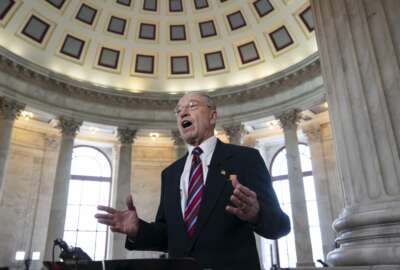
House Dems want investigation of Trump administration’s nondisclosure agreements
After most Homeland Security Department nondisclosure agreements were deemed noncompliant with federal whistleblower laws, congressional overseers worry about o...
To listen to the Federal Newscast on your phone or mobile device, subscribe on PodcastOne or Apple Podcasts. The best listening experience on desktop can be found using Chrome, Firefox or Safari.
- Most of the Homeland Security Department’s signed non-disclosure agreements do not comply with federal whistleblower laws. DHS regularly requires its employees to sign NDAs to access certain agency systems and information. But the DHS inspector general said over three-quarters of the NDAs it reviewed do not ensure federal employees are aware of their own whistleblower rights. House Oversight and Government Reform Committee Ranking Member Elijah Cummings (D-Md.) and Rep. Gerry Connolly (D-Va.) said the IG’s findings are reason to investigate the issue across government. (House Oversight and Government Reform Committee Democrats)
- Office of Personnel Management Director Jeff Pon applauded the inclusion of a new hiring flexibility in the 2019 defense authorization act. The NDAA lets civilian agencies recruit and hire recent graduates and college students to certain federal positions more quickly and directly. President Donald Trump signed the NDAA into law earlier this week. Pon said agencies now have more discretion to determine how many applicants they should consider before making a competitive hire. (Office of Personnel Management)
- The Army is launching an effort to boost soldiers’ chances for civilian employment. The branch calls it the Credentialing Assistance Program. Much like the military’s Tuition Assistance Program, it will cover soldiers’ costs for earning professional certifications that relate to their military specialties. For a trial run, the Army is conducting a limited user test at Fort Hood, Texas. All soldiers assigned there will be eligible to sign up starting in September. Depending on the results, officials plan to tweak the program and potentially expand it across the service. (U.S. Army)
- Thomas McCaffery is tapped to become the next assistant secretary of defense for health affairs. McCaffery currently serves as the principal deputy assistant secretary of defense for health affairs and has been in an acting assistant secretary role since August 2017. He previously served as vice president of California State Partnerships. He was also the senior vice president of the Alliance of Catholic Health Care. (White House)
- Four FBI employees were promoted to the agency’s cyber ranks after several experts left in recent months. Among the personnel moves, Amy Hess is the new executive assistant director of the Criminal, Cyber, Response, and Services Branch, and Marlin Ritzman is the assistant director of the Information Management Division. Additionally, Michael Gavin moves up to be the assistant director of the IT Applications and Data Division. (FBI)
- The State Department approved hundreds of multi-million-dollar purchases without ensuring it was getting the most value for its money. A recent inspector general report found the agency did not implement a value engineering program mandated by the Office of Management and Budget in 2013. The only bureau that did set up a VE program saved nearly $50 million in fiscal 2016 through cost avoidances. (Federal News Radio)
- Federal scientists called the Trump administration science policy abysmal. That’s from a survey of scientists in 16 federal agencies, conducted by the left-leaning Union of Concerned Scientists. Several thousand responded. The union claimed widespread political interference in what it calls the science policy process. The survey found many scientists unable to do their jobs effectively because of staffing cuts and a leadership vacuum. Nearly one in four scientists at the Environmental Protection Agency said political appointees interfere with their work. (Union of Concerned Scientists)
- The Defense Innovation Unit said it’s taking some time to reflect on the way it works after a few public hiccups. The organization is tasked with courting nontraditional defense companies. DIU acting Managing Partner Sean Heritage said DIU is being more deliberate about how it communicates and writes contracts to avoid future issues. (Federal News Radio)
- The U.S. Agency for International Development is seeking help to move further away from accepting paper documents. USAID wants to replace its legacy document management system with one that’s in the cloud. USAID issued a request for information for a new correspondence management and tracking system. The agency said the new solution would automatically accept correspondence and documentation, sort and categorize it, and then notify the appropriate processing areas and individuals for their feedback and approval. USAID currently receives various types of digital documents and various correspondence in paper format. Its objective is to further streamline the intake and triaging process and to reduce the overall dependency on paper. Responses to the RFI are due Oct. 15. (FedBizOpps)
- Traveling for work? Federal employees are getting a little more help with food while on the road. In 2019, the per diem rate set by the General Services Administration will go up to $149 a day. That’s $94 a day for lodging, and 55 for meals and incidental expenses. A $4 increase for meals compared to 2018. GSA also added Marietta, Georgia as a non-standard per diem area. But it removed 21 other regions from that list. (Federal News Radio)
Copyright © 2024 Federal News Network. All rights reserved. This website is not intended for users located within the European Economic Area.
Eric White
Eric White is news anchor and Federal Drive producer at Federal News Network.
Follow @FEDERALNEWSCAST
Related Stories
Twitter

Accountability office says VA struggling to track misconduct, protect whistleblowers




